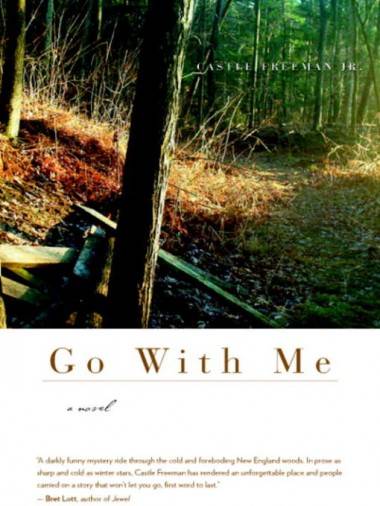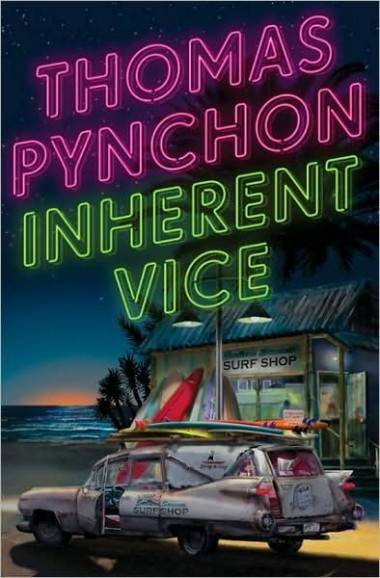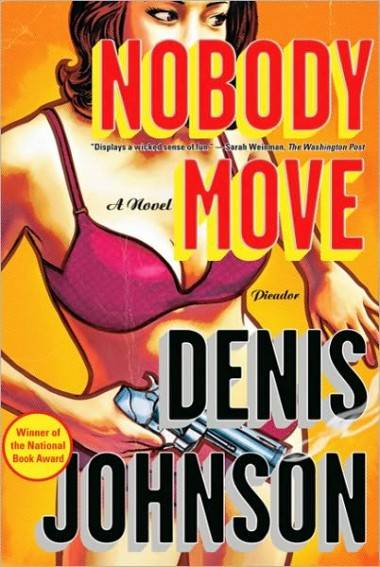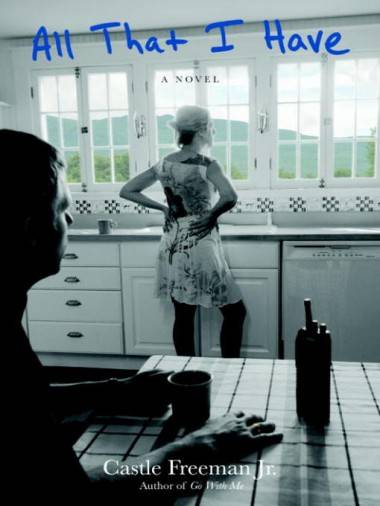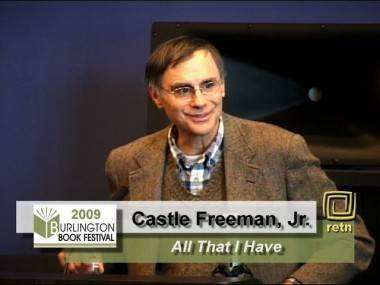Interview with novelist Castle Freeman
– by Shawn Conner
I discovered Go With Me completely by accident.
I was browsing in the mystery/thriller section of an independent bookstore in California wine country, looking for a good pool read, when the slim, elegant volume caught my eye. I’d never heard of the author, Castle Freeman Jr., but points for having a cool name; also, the novel’s thinness – readable in a day or two, tops – was appealing.
Once I started, I couldn’t stop.
Without giving away too much, a young woman, Lillian, dismayed over the murder of her cat by Blackway, the local heavy who dwells in the woods near the small town in which she lives, goes looking for help. She finds not “the army she would like,” to paraphrase Freeman from an interview earlier this year, but “the army available”: Nate the Great and an old codger, Lester Speed, who agree to accompany her. Interspersed with their journey is a running dialogue, a veritable Greek chorus of beer-drinking locals who, in terse, funny language, ponder the fate of the unlikely trio as they head for a confrontation with Blackway.
All That I Have, Castle Freeman Jr.‘s follow-up, is just as short (165 pages) and just as fast-paced, though more character-driven. In it, Sheriff Lucius Wing must deal with an invasion of Russian bad guys in his town, while facing some uncomfortable truths about his marriage and wife, Clemmie. I liked All That I Have but I loved Go With Me; the reader who dips into either will find him or herself fully immersed in a propulsive plot, vivid characters, and tersely poetic language.
I reached Castle Freeman Jr. (born in Texas, schooled in Chicago, lived in New York, settled in Vermont) at his home early one late October afternoon (EST).
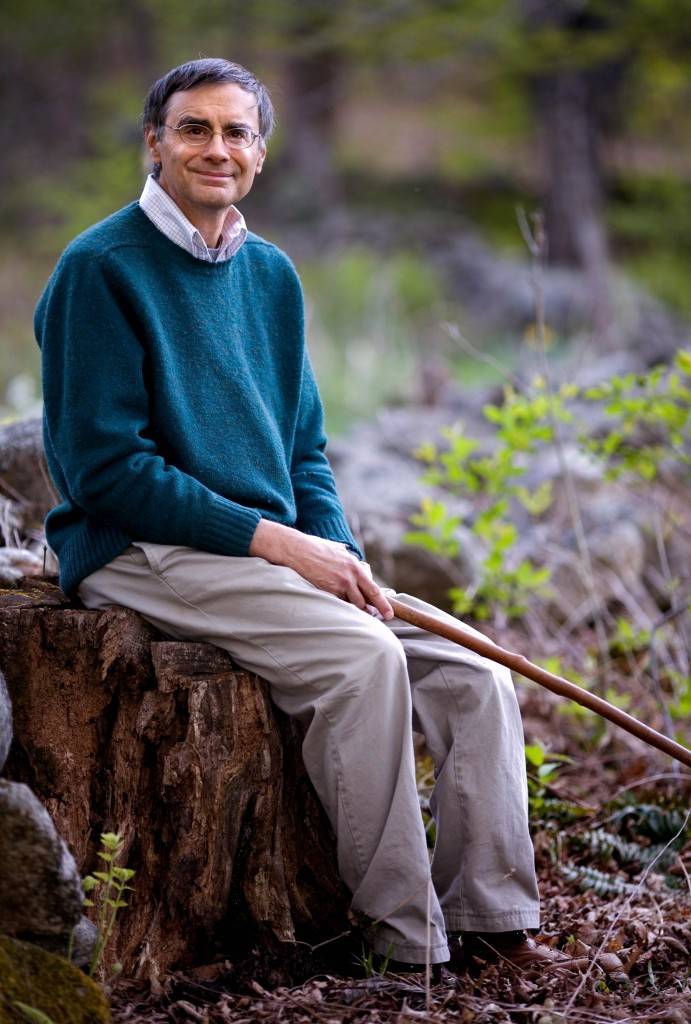
Castle Freeman Jr. Channing Johnson photo.
Early days of struggle
Shawn Conner: So let me see if I’ve got the chronology straight. You wrote a book of short stories The Bride of Ambrose, a first novel, Judgment Hill, that was published in 1997, and then a novel, My Life and Adventures, that came out in 2002. Go With Me was published last year (2008). What were you doing in between novels?
Castle Freeman: Well I write other things as well as novels. I write short fiction and essays and journalism and even op-ed stuff. I guess for a couple of years I was mostly concentrating on other kinds of writing. And then I got back into novels with Go With Me. And, as it happened, only by chance really, I went on to do my new one, All That I Have. But that kind of productivity is unusual for me.
SC: I read a review of My Life and Adventures and the impression I got was that your newer novels are a little bit different in that maybe they’re more in the literary thriller genre.
CF: They’re certainly more like that than was My Life and Adventures. To my mind, the big difference with these last two novels is they’re much more focused from the narrative point of view. They have much stronger storylines than My Life and Adventures had. That was only a “novel” because I couldn’t think of anything else to call it. It’s kind of a combination of memoir and reflection and fiction. It’s kind of an unusual book. These two new ones are more conventional.
From the literary to the literary thriller
SC: So did something change for you, maybe in the kinds of books you read?
CF: Well, I don’t know if anything changed in my reading habits. I felt the fiction I had written… I wanted to try something new, something that had a stronger story, and was more pointed and fast-paced than the books I had written before. It was really more in the interest of trying something new and stretching a little bit as a writer. More that than a change in reading habits or way of life or anything.
SC: Were there any books that were models?
CF: I don’t know; there certainly are books that I’m particularly fond of, but I would think more of classic novels. I’m thinking in particular Faulkner and people like that. You could maybe call some of his books “literary thrillers”, but he’s always been a favourite of mine.
SC: It seems lately some very respected authors have been trying their hands at genre fiction, or potboilers – Thomas Pynchon with his latest, Inherent Vice, which is a detective novel, Ron Carlson‘s The Signal…
CF: I know that about Pynchon, that is interesting. I don’t quite know what would account for that.
SC: And Denis Johnson‘s Nobody Move is just a terrific noir book, a great piece of pulp fiction.
CF: Well he’s Mr. Noir, isn’t he? The last one I read by him was Resuscitation of a Hanged Man [1991]. It’s a pretty strange book, it certainly is noir, so check that one out.
All That I Have
SC: [Spoiler alert] In a recent interview, the interviewer brought up various plot points in Go With Me. So I wanted to bring one up with you. I really liked All That I Have but there was one stumbling block for me. In the final confrontation between Sheriff Wing and the Russians, Wing doesn’t once mention his deputy’s beating at the hands of the Russians.
CF: To tell you the truth, I hadn’t thought of that. I wanted the final scene between the sheriff and the Russian bad guys to be kind of surreal. It is of course, it strains credibility to the breaking point, because the whole book establishes the Russians as dangerous and violent people. And then the sheriff just comes to their house and tells them to get lost – and they do. That’s obviously not something that would happen in real life. The unreality of the scene I intended. I didn’t think about the point you make, with them having worked over the poor deputy.
SC: One of the things I really liked about the book was how the nickname, Superboy, for one of the characters, is never explained.
CF: Part of the purpose of the book is to give the reader a feeling for a tight-knit and fairly isolated community where everybody knows everything about everybody, but the outsiders don’t. They have to infer all this stuff. That goes for the reader as well.
SC: Both Go With Me and All That I Have seem to have been pared down to the absolute minimum. Do you write more than what ended up between covers?
CF: Yes. Especially in Go With Me. I wrote a good deal, at least a few chapters, that I didn’t like and that didn’t make the final cut, so to speak. Not so much for All That I Have, that went much faster and more concertedly.
Other writing
SC: In that same interview, you say you are going to concentrate on short stories and essays.
CF: Yes. I had planned for this current year and next to get back to writing more short stuff. I write regularly for a couple of publications back here. It’s unusual for me to have written two books in two years, really. I would kind of like to kick back and recharge my batteries and then try something new in another year or so.
SC: What are the publications you write for?
CF: As of recently, Vermont Life magazine, which is published by the State of Vermont, which is kind of a picture and text magazine about the state of Vermont, and I’ve written regularly for years for The Old Farmer’s Almanac, which is published in New Hampshire.
SC: What if you get an idea for a novel?
CF: If a good idea for a novel strikes me, then I’ll go for it. But I’m not out seeking inspiration at this point.
SC: Go With Me seems ripe for some aspiring director to make into a movie.
CF: We have actually had quite a lot of interest in the movie and TV industry and a screenplay has been written, not by me – I really wasn’t into writing a screenplay. There’s a group of three guys in Los Angeles, a screenwriter, a director, and one of the producers, and they are now shopping it around, looking for cast members. If that goes well they will attempt to raise money and make a movie. Whether or not that will ever happen I can’t say.
SC: Who would be the perfect cast in your mind?
CF: Oh, I don’t really know. They’ve talked to a lot of different people. Their feeling is that we need a good older male actor to play Lester, and then a young female, and it’s the young female… there are lots of good middle-age to elderly male actors, but the key from their point of view, is the young woman. They’ve been paying special attention to find someone to play her.
SC: How old is she in the novel?
CF: It didn’t say. Mid to late 20s, in my mind.
Keeping it local
SC: It seems you have a good relationship with your publisher, Steerforth Press.
CF: Yes. They’ve been wonderful, I think they’re an excellent organization.
SC: They’re in Vermont?
CF: They’re in New Hampshire, right across the river. But they’re only about an hour-and-a-half from where I live. They’re a very small shop, but they do a terrific job.
SC: Have you done any book tours?
CF: Yeah, I’ve been doing quite a bit of that in the last couple of years for both books. I haven’t been out of New England, but I’ve been driving around up here quite a lot.
SC: Who are your readers?
CF: Well, I guess, a lot of the readers I’ve met have been people who are interested in the same kind of writing that you are, kind of mystery-angled literary work, also regular old literary readers, and people interested in Vermont and northern New England. Most of them I’ve been gratified to find that a lot of younger readers seem to like these books, people in their 20s and 30s. It’s not all old-timers, so that’s very nice for a writer.
SC: Can I ask how old you are?
CF: Yes, I’m 64.
SC: So you published your first novel fairly late in life.
CF: Yes, I was not a spring chicken. My first novel was published in ’97. I’d written one novel before that, that no one wanted to publish, probably for a good reason. I recycled part of that into My Life and Adventures.
SC: Do all of your short stories take place in New England?
CF: No, most of them, but not all. I get off the reservation a little bit in the short story department.

